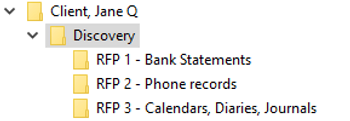
The discovery phase of your suit is critically important. It is very common for clients involved in lawsuits to view the discovery process as a pointless waste of time. In general, this is not true. Much of the evidence that is gathered is, in fact, necessary moving forward toward resolution of your case. While the purpose of the information may not always be obvious at first, it will almost certainly be necessary to frame the facts that inform the pleadings, drive settlement negotiations at mediation, or be presented as evidence at trial.
It will be time-consuming, and it will may be difficult to obtain some of the information requested. Almost everyone resents this process to some extent. However, you should trust us when we instruct you as to how to move forward and do this correctly, rather than spending valuable (and billable) time bemoaning the effort that has to be put in to it. Having done this hundreds of times, we have heard all of the complaints many times over and we can assure you that protesting will have absolutely no effect on the outcome of the suit. What it will affect is your bill.
You may think you shouldn’t have to produce a document or answer a question posed, or you may consider withholding this information deliberately. You may try to avoid producing as inasmuch as you can. Be aware that this type of avoidant behavior can cost a great deal of money and can ultimately ruin your credibility.
Refusing to participate in a good-faith manner will result in serious consequences. The Court can force you to pay the other party’s attorney directly for non-compliance. Further, if you demonstrate a lack of interest in a forthright evidence-gathering process, the Court will conclude that you disrespect the Court, or the law, or that you are being deliberately deceptive. If the Court makes this assessment, you will have dealt yourself a crippling disadvantage moving forward. The Court could refuse to allow your evidence in, it could dismiss your filings (strike your pleadings), and it can even dismiss your case entirely. Eventually, through these means, the Court will force you to answer.
You must answer all of the discovery requests completely and truthfully. This office, and every other office and attorney in Texas, will absolutely comply with the discovery process, and so will you. This is a fundamental and intractable component of litigation, and it can be invoked in virtually any lawsuit.
You must begin this process as soon as you are asked. All of the materials that are being requested need to be worked on daily until the process is completed. You should bring all of you materials into our office (or upload them to a file-sharing service) long in advance of the deadline so that we can preempt any shortfalls. Plan to have finished gathering documents and answering interrogatories within two weeks. If you do not make a persistent and diligent effort to produce discovery properly, the contract between you and this firm allows your attorney withdraw from your case. The attorneys on your case will have no choice but to do that if you do not comply.
How to Answer
Interrogatories
We will have a meeting or call to discuss what the Interrogatories are asking for. Then, you should prepare a draft of the answers, ideally answering in-line with the questions posed using a text-editing software. Don’t worry too much about what you are writing, as all you need do is be honest about the question posed. Do not offer additional information beyond the answer to the Interrogatory, but answer the question asked directly and succinctly.
Your responses will need to be signed, and we always have them verified before a notary. You can usually find a notary at your local bank or credit union, as well as any of those pack-and-mail-type places, such as a UPS store. We can also do this in-office if one of the notaries is here, but you will have to schedule a time for that.
Request for Production
This is usually the most time consuming response to generate, because you must produce documents responsive to most, if not all, requests. You may have to order older bank statements from your bank, for instance. You should produce documents in Portable-Document Format (pdf) whenever possible, and you should produce formal, complete statements rather than screenshots or downloaded text or comma-separated-values (CSV) files. Invest the energy in doing it right the first time, as we will ask you to do it a second time if it isn’t presentable. Always get actual statements.
You may not understand every question in the request for production, which is why we have our initial meeting or call to go over what you need to do. After our call, you should begin gathering the requested documents and plan to bring them in within 1 to 2 weeks. You should organize them electronically in folders corresponding to the number of the request, like this:

If you choose to present the material in a disorganized fashion, your paralegal or attorney may have to sift through the information and organize it while billing at his/her hourly rate. This will be an additional and unnecessary expense to you. The more work you do in completing this task, the less you will be charged in having our office put it all together for service to opposing.
Request for Admissions
This document is pretty straightforward. You simply respond with ‘admitted’ or ‘denied’.
Rule 194 Request for Disclosures
This is a technical document to be exchanged between attorneys’ offices, but it does require some input from you in that you will identify the name, address and telephone number of any potential witnesses in your case, including you and the opposing party, and the attorneys, as well as any other witnesses.
The discovery process is often arduous and tedious, but that doesn’t mean it can be ignored. By following these guidelines, you can help avoid unnecessary delays and costs associated with your case.


